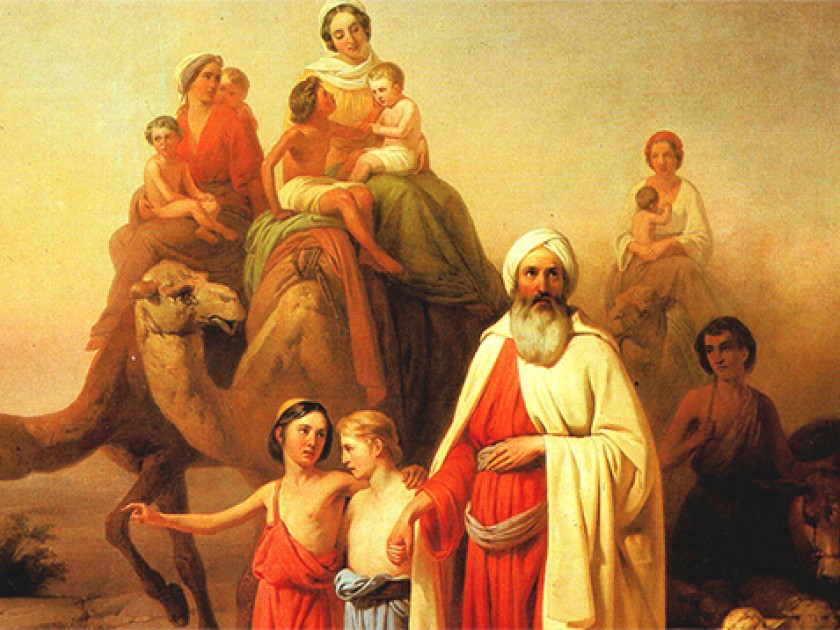
Earlier this week, Jacob Bacharach shared the story of braving his mother’s book club and telling her friends the Bible is weird. With the release of his novel The Doorposts of Your House and on Your Gates this Tuesday, Jacob has been guest blogging for the Jewish Book Council all week as part of the Visiting Scribe series here on The ProsenPeople.
The first thing you think you remember about Abraham is probably the smashing of the idols, an incident that occurs nowhere in the Torah.
It was a later addition contained in midrashic commentary written sometime between the fourth and sixth centuries CE, a millennium after the likely date of the actual composition of the texts we think of as Genesis. The fine narrative details of this, and the implied internality they lend to the character of Abraham — his father, Terah, as an idolater and idol-maker; the young Abraham’s dialogues with a series of customers; his confounding of Nimrod, who at Terah’s behest tries to get him to worship fire, water, the wind — are all missing from the original, in which Terah, merely the last in a genealogy, tells his son Abraham (still known as Abram), Abraham’s wife Sarai, and his great-grandnephew Lot, to gather their shit. They set out, for no particular reason, for Canaan. They only make it as far as a place called Haran, somewhat confusingly, because that is also the name of Abraham’s brother and Lot’s father, who has already died. Terah, now two hundred and five, dies in Haran.
Only in the next chapter does the Lord appear to Abraham to tell him, “Get thee out of thy country, and from thy kindred, and from thy father’s house, unto the land that I will show thee,” upon which the motley company — now somewhat enlarged by slaves and other possessions — heads to Canaan, where they wander briefly before discovering “a famine in the Land” and immediately hightailing it south to Egypt.
This commences a series of wanderings, confrontations, and misdirections. Twice, in order to keep nasty foreign rulers from abducting and marrying his own wife, Abraham claims Sarah is his sister, with somewhat odd results. In Egypt, for one, “the woman was taken into Pharoah’s house” and made his wife, a situation only resolved when God, quite absent any explicit request from Abraham, sends “great plagues,” a foreshadowing of Exodus.
(This is also pretty clearly a polytheistic world, in which the God who eventually makes a covenant with Abraham is still sometimes simply God “Most High” — the strong implication is that there are others who are merely lesser.)
The gang wanders some more. Abraham and Lot argue and split up. Abraham has his first son, Ishmael, with the Egyptian maidservant Hagar. We pause for the destruction of Sodom and Gomorrah and the flight and sad end of Lot. We return to Abraham sending his “sister” once again into the hands of a king, this time Abimelech, who also takes her as a wife before God comes to him in a dream and gives him the lowdown. When Abimelech awakes he confronts Abraham in anger, but then, for some reason or other, gives him a bunch of livestock and lets him live high on the land.
Then comes the miracle of Sarah’s pregnancy, the birth of Isaac, and God’s terrible demand for the sacrifice of their young son.
It is not at all the neat narrative we remember from Hebrew School, but for a writer of contemporary fiction, it’s a fascinating template on which to overlay a more modern story — personally, I thought a good analogue for the land-obsessed, peripatetic nature of the tales was a world of natty real estate development—precisely because it’s so weird and diffuse and because its characters are hardly even that. As the authors of the midrash were able to back-project their own ideas about monotheism in narratives that expanded and altered the more ancient texts, so too can a novelist today hang a story set in the late twentieth and early twenty-first centuries on top of the protean, biblical text.
One narrative idiosyncrasy I do try to take from these myths, even as I mutate and expand them, is permission to make a story a bit odder, a bit vaguer than a lot of contemporary fiction permits. I’m not opposed to narrative sense or to characters with a recognizable psychology, but if I have a complaint about a lot of current writing — at least, current American fiction — it’s that in both plotting and evocation of inner life, stories can become schematic: they can seem to suppose a clear causal path from plot point A to plot point B, from initial characterization through challenge through epiphany and change that, even when a character errs terribly, makes a kind of deep, logical sense. But who makes deep, logical sense? What I like about the old stories, slender though they can seem, is that they permit a senselessness to their lives, an unmooredness that seems to me to resemble, perhaps only accidentally, the incomprehensibly real lives we lead.
Jacob Bacharach is the author of the novels The Doorposts of Your House and on Your Gates and The Bend of the World. His writing has appeared in the New Republic, Ha’aretz, the Pittsburgh Post-Gazette, and many others. He lives in Pittsburgh, PA.